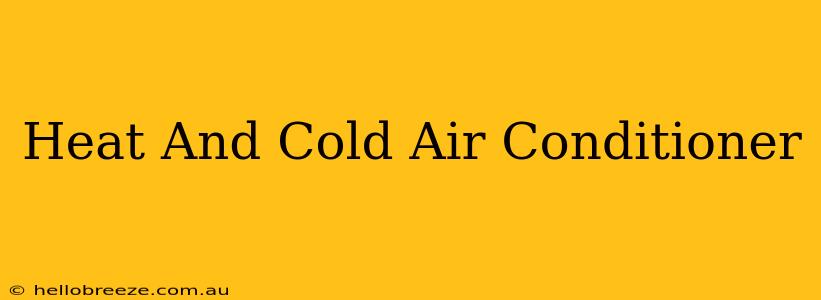Are you tired of battling extreme temperatures in your home? Investing in a heat and cold air conditioner, also known as a heat pump, could be the perfect solution for year-round comfort and energy efficiency. This comprehensive guide will explore the benefits, features, and considerations of choosing a heat and cold air conditioner for your home.
Understanding Heat Pump Technology
Unlike traditional heating and cooling systems that use separate units, a heat pump cleverly utilizes the same system for both heating and cooling. It works by transferring heat rather than generating it, making it incredibly energy-efficient. In the summer, it extracts heat from inside your home and releases it outside, providing cool air. In winter, it reverses the process, extracting heat from the outside air and transferring it indoors to provide warmth.
Key Advantages of Heat and Cold Air Conditioners
- Energy Efficiency: Heat pumps are significantly more energy-efficient than traditional heating systems, often reducing energy bills by a considerable margin. This energy savings contributes to a smaller carbon footprint.
- Year-Round Comfort: Enjoy consistent temperatures throughout the year, eliminating the need for separate heating and cooling systems.
- Cost Savings: While the initial investment might be higher than a single-function system, the long-term savings on energy bills often make it a worthwhile investment.
- Quiet Operation: Many modern heat pumps operate more quietly than traditional furnaces or air conditioners.
- Improved Indoor Air Quality: Some models include features like air filtration to improve the overall air quality in your home.
Types of Heat and Cold Air Conditioners
There are several types of heat pumps to consider, each with its own advantages and disadvantages:
- Air-Source Heat Pumps: These are the most common type and extract heat from the outside air. They are suitable for most climates but may become less efficient in extremely cold temperatures.
- Ground-Source Heat Pumps (Geothermal): These utilize the constant temperature of the earth to extract or release heat, resulting in higher efficiency, especially in colder climates. However, they require significant upfront investment for ground loop installation.
- Water-Source Heat Pumps: These use a body of water, such as a well or lake, as a heat source or sink. They are highly efficient but require access to a suitable water source.
Choosing the Right Heat and Cold Air Conditioner for Your Needs
Selecting the right heat pump depends on several factors:
- Climate: Consider the average temperatures in your region. Air-source heat pumps are generally suitable for milder climates, while ground-source heat pumps are better suited for colder climates.
- Home Size: The size of your home will determine the capacity (BTU rating) of the heat pump you need.
- Budget: Consider the initial investment cost as well as the long-term energy savings.
- Energy Efficiency Ratings: Look for high SEER (Seasonal Energy Efficiency Ratio) and HSPF (Heating Seasonal Performance Factor) ratings.
Installation and Maintenance
Proper installation is crucial for optimal performance and efficiency. It's essential to hire a qualified HVAC technician for both installation and regular maintenance. Regular maintenance, including filter changes and inspections, will extend the lifespan of your heat pump and ensure its efficient operation.
Conclusion: Embracing Year-Round Comfort
Heat and cold air conditioners offer a compelling solution for those seeking energy-efficient and comfortable year-round climate control. By carefully considering the factors discussed above, you can choose the perfect system to meet your needs and enjoy optimal comfort and savings for years to come. Remember to consult with a qualified HVAC professional to determine the best option for your specific home and climate.

